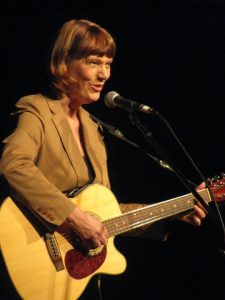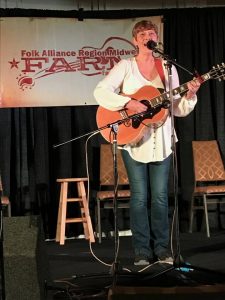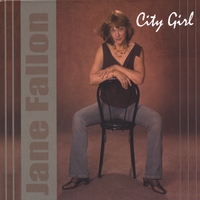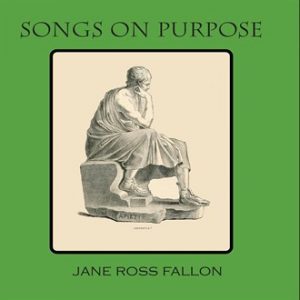
Jane Ross Fallon
Jane Ross Fallon has been a very successful singer-songwriter for a very long time, successful in that she’s won numerous singer-songwriter contests and successful in reaching many, many people throughout the region with her words and music.
When asked about her latest first place songwriter contest success, the New Hampshire-based Fallon was unsure which contest was being referred to. She had won two different contests and placed first runner up in a third in just the past month. She won the Purposeful Contest in Fort Campbell at the Maritime Festival where she went out to play her song. The second one she just recently won was a lyrical contest for American Songwriting Magazine in which she emerged victorious among 2000 entries.
“It’s always fun,” she said. “We songwriters need validation to a certain extent. We can get that through audiences sometimes but I think particularly a validation for me as a purposeful songwriter is I can look at a contest and I can say this is what they want, this is what will best represent what they’re trying to achieve, and do the research, and put it together and know that I succeeded at that. That means a lot to me.”
Fallon’s song “If It Mattered,” from her 2006 release City Girl, won the lyrical contest. She had sent it out to the American Songwriting after nationally known songwriter Jason Blume had raved over the lyrics at a Hawaii Festival. He had looked at it and said “Holy crap. There are three lines in here I wish I would have written.” After being forced by that compliment to reevaluate her lyrics, Fallon sent it out to the judges as an entry. After winning many of these contests over the years, it’s still difficult for Fallon to pinpoint why she has had so much success with them.
“I think, first of all, you have to look at the contest and read it carefully: what do they want,” she said. “Sometimes people have said look at what’s won in the past, and that sometimes works and sometimes it doesn’t. In the case of one I won in Ireland, they wanted a song for their town Carrick, which is one the river Suir, for the Tenth Anniversary of The Clancy Brothers Festival. I had never done that before, so I didn’t’ have anything to build on except to look at what happened at Carrick and do some research and come up with something I thought was suitable. But, if I hadn’t really focused on Carrick, I wouldn’t have been chosen.”

Jane Ross Fallon
Fallon once won The Woody Guthrie Songwriting Contest by entering a song that was counter-cultural. Her song, “Northern White” which is about frack sand mining in Wisconsin destroying the top soil. “That’s very Woody,” Fallon said. “They were actually looking for a fracking song, and that’s a fracking song. So, I just sent the right song in at the right time. Sometimes it’s opportunity meeting preparation. An accident is in there too sometimes.”
Fallon has taken to a whole new height her knack for writing a topic based on purpose instead of just writing from emotion and inspiration. Late last year, Fallon released her CD Songs On Purpose with a companion book called Beyond Reason: Songwriting On Purpose. In her book, Fallon focuses on the value of academics to support an argument or thesis, the importance of which she appreciates after teaching college English for 30 years.
“There are certain principles that go way back to Aristotle,” Fallon said. “I thought this is all communication. That’s what songwriting is: communication. So, when you have a specific reason you want to write for like a cause or an event, you can use these same tools.” Fallon referred to Aristotle’s three ways to engage an audience: emotions, logic, or humor. “Emotions and logic are it,” she said. “You can hit their heart or hit their head.”
Fallon’s book Songwriting On Purpose is academically structured in the way it breaks down Aristotle’s three methods. She would like to develop her book into a college course at some point. “I’m going to talk to a community college about it as an elective. I think you could use it as a critical thinking elective or as an English elective,” she said. “It’s academic and yet I try to make it colloquial and easy going, not make it too hard to read.”
Fallon’s Songs On Purpose CD opens with her tune “Before The Fire,” a moody, dramatic piece about a racial incident in Florida. She began it just wanting to write a story about Florida because it was for a Florida songwriting contest. After coming across an old news story about a disturbing racial incident, Fallon was shocked nobody had ever written about it. Fallon wrote the lyrics from the point of view of a woman who had accused a local black man of assaulting her because, as a married woman, she couldn‘t admit, at that time, that her secret white lover had physically abused her.
“I had to pick the right details to tell the story so people would understand it,” she said. All of the material on her Songs On Purpose CD jump out at the listener for being socially conscious. That is because writing for a reason, as opposed to writing for an emotional reason, usually results in socially conscious lyrics, the environment, war, racism. Racial issues figure prominently in Songs On Purpose, especially “The Town Of Sugar Groove,” which focuses on a strong woman who aids former slaves fleeing to northern free states.

Sassy, sexy album cover, 2006
“Those are the songs that one find the most desire to have a purpose to communicate,” Fallon said. “That’s why most of those are that way. ‘Before The Fire’ and ‘The Town Of Sugar’ are both historical events that happened in our country that we can learn from.”
Fallon had, for several years, taught English at Southern New Hampshire University but that ended, three years ago, when she was in a car accident that she had to take time to recover from. Aside from occasionally teaching a course, she is no longer officially connected to a college or university. She has a BA in English and music and an MA in English literature. She didn’t reach for any degrees higher than her MA because she was a busy singer-songwriter with a family to raise. “It’s English composition, which is why I know this stuff,” she said. “I also grew up in a musical family, everybody staying with an instrument.”
Fallon learned song narrative from singing songs with her Missionary Baptist family. Her father came from Arkansas where his family lived during the Great Depression. This is where Fallon got her Appalachian roots and her interest in gospel. “I think that’s why I like the narrative so much,” she said. “I learned how to play guitar with an old folk book with Barbara Allen and Shenandoah and all these old lyrical songs, and I love those. I just love telling the old murder ballads and the old child ballads. My dad would sing these story songs at night that he learned from uncle.”
Fallon considers her influences to be the artists like Joni Mitchell whom she was listening to when she was a teenager, the literate singer-songwriters. “I loved all those songs that talked about things that were beyond the pop thing,” she said.

Jane Ross Fallon’s CD of socially conscious songs
Any fan of Fallon’s songwriting knows that her father continually shows up in her songs. She describes her father as a larger than life figure, a man who once actually dynamited a damn to keep a river from overflowing. With that kind of image of her father, it’s easy to understand why he would loom large in her imagination. Her song “He Deserved The Hat” captured how he worked on the range like a real cowboy, not someone who just accessorized with western style outfits.
“He was that hard working guy who just loved the outdoors and had so many stories to tell and everybody liked him,” she said. “He was just the epitome of the rise of people from that era who didn’t have any education but worked their tails off and always had a sense of humor.”
Fallon’s future goal is to just keep creating better and better music. “I want to leave something behind that has universal value that we see in some of these songs,” she said. “I want to write something like that. I want to continue with my personal goals of getting out music to wherever I am and people go wow ‘I’ve never heard anything like this’ or ‘this is different.’”

